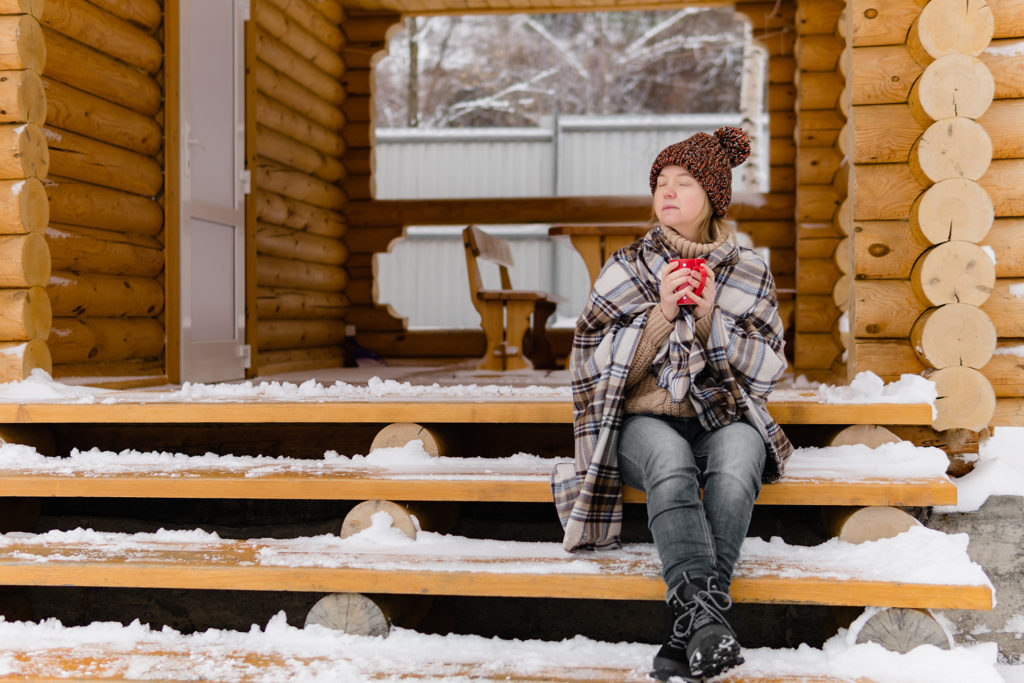Top Tips To Stay Healthy In Winter

For some of us, the winter months hold a special kind of magic – picturesque snowy scenes, seasonal festivities and cosying up indoors. But it’s not everyone’s favourite season. The cold weather and lack of daylight, coupled with lurking viruses and sick bugs, can take their toll on both our physical and mental health.
However, there are a few simple things we can do to help ourselves stay well during the winter months, which could help prevent, or lessen the symptoms of, common ailments such as a cold or the flu. Lane Wells, Registered Nurse for AXA PPP healthcare shares some top tips for keeping you and your family healthy this winter:
1 Eat well
Wintery weather conditions inevitably lead to cravings for stodgy comfort foods, which is triggered by a change in our body’s hormones. Carbohydrates often satisfy the hunger pang, but there’s no need to feel guilty about tucking in – carbohydrates give us energy, with many sources also containing high levels of fibre that aid our digestive system too.
It’s important to ensure you’re eating at least five portions of fruit and vegetables every day to absorb as much vitamin C as possible to protect your immune system. Why not make the most of delicious seasonal produce, such as carrots, pumpkin, swede and turnips to create healthy, warming dishes like soups and stews?
Vitamin D is also really important during the winter months due to the lack of natural sunlight. Therefore, enjoying oily fish, red meat and eggs as part of a balanced diet will ensure you receive the necessary nutrients.
2 Keep moving
The wet and cold weather means it can be hard to muster up the energy to go outside and stay active – particularly when there are fewer daylight hours to squeeze it in to! But, being active has many immune system and mood boosting benefits, so it’s worth keeping it up.
Simple activities like brisk walking or a home workout from the comfort of your living room can be both enjoyable and worthwhile for our physical and mental health. Why not recruit an exercise buddy to help keep you motivated?
If you do feel you’re coming down with the lurgy, listen to your body. If you’re keen to continue exercising, stay hydrated – keeping moving can actually help in breaking up congestion in the nose and throat. Moderate exercise won’t prolong or worsen your symptoms necessarily, but if you’re feeling run down, rest and recuperation is really important to aid your recovery.
3 Keep warm
This may sound like an obvious point, but to help prevent illness and promote wellbeing, avoid getting too chilly. Long term exposure to cold and drier air can weaken our immune systems, so don’t stay out in the cold for longer than you have to.
Layering up is an effective way to retain body heat and therefore keep warm. So, prepare for wintery conditions by regularly checking the weather forecast. Multiple thin layers will keep you warmer than a single thicker layer, as warm air gets trapped between the layers, acting as an insulator. You’ll also feel more comfortable moving between indoor and outdoor temperatures. It’s also wise to wear a hat, as this is where our bodies lose most heat.
Don’t forget to keep your home at a suitable temperature – at least 18 degrees is advised – so you stay toasty through winter.
4 Get outdoors
Reduced sunlight during winter can disrupt our sleep and waking hours, leaving us feeling sluggish and tired. The lack of daylight causes our brain to produce excess melatonin – the hormone that makes us feel sleepy. After all, we rely on the sun for vitamin D to boost our energy levels. It may, therefore, be tempting to stay in bed for longer to make up for it – but don’t hibernate, as this may only increase these feelings of lethargy. Instead, spend as much time outside as possible to help beat winter fatigue, whether it’s a short walk at lunchtime or a quick jog after work.
5 Flu vaccination
To prevent the dreaded winter virus, getting a flu jab is one of the most reliable preventatives. Cold and flu symptoms can be very similar; however, the flu tends to be more severe, affecting more than just the nose and throat. Instead, it leaves us feeling exhausted and unable to function as normal. Other common symptoms include body aches, a sudden fever, diarrhoea and vomiting.
Certain groups of vulnerable people are entitled to the flu vaccination free on the NHS. These include; the over 65s, people with certain medical conditions like asthma, children aged between two and 11 years old, as well as frontline health or social workers. If you are considering getting the jab, then consult your pharmacist.
6 Manage SAD
Seasonal Affective Disorder (SAD) is a type of depression that comes and goes in a seasonal pattern, and is most prominent between September and April. This disorder can also be known as “the winter blues” given that symptoms are normally more apparent and severe in this season.
There are a number of symptoms linked to SAD, including; a persistent, low mood, an increased appetite, a lack of interest in what you usually enjoy doing, a loss of energy for socialising and heightened emotions, predominately sadness and depression.
There are a handful of measures that may help with managing SAD:
• Lifestyle measures – Try to get as much natural sunlight as possible, whether that’s by going outside, or making sure your home is as light and airy as possible. Exercising regularly will also release endorphins to combat low moods.
• Light therapy – This involves using a special lamp called a ‘light box’ which is used to simulate exposure to sunlight. These can easily be purchased online, or on the high street in different forms, such as alarm clocks and desk lamps.
• Talking therapies – To help ease the emotional strain of SAD, visiting a counsellor or having Cognitive Behavioural Therapy (CBT) can help. CBT aims to re-wire how the brain processes the way we think and behave. This helps you to deal with overwhelming problems in a more positive way, by breaking them down.
If you would like more advice on identifying and dealing with SAD, visit your GP.









